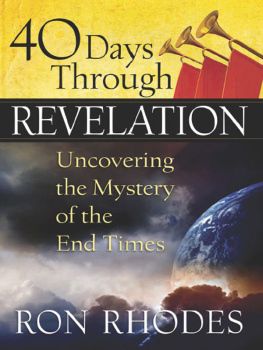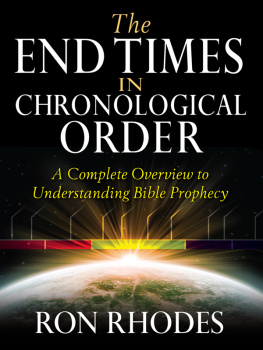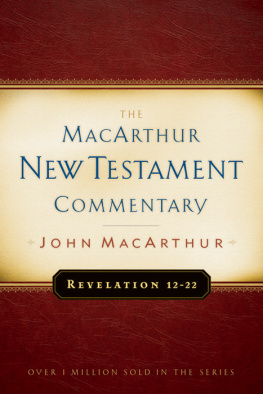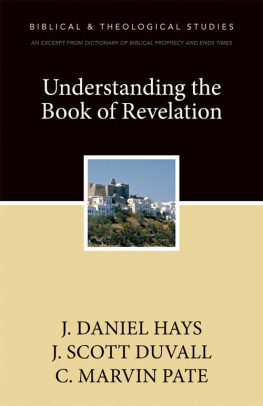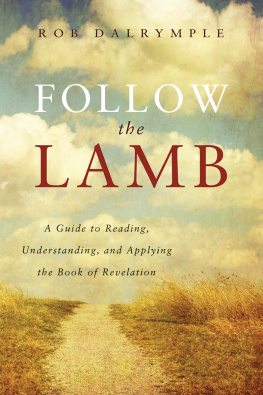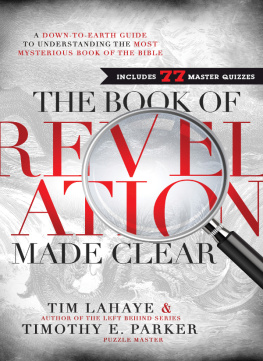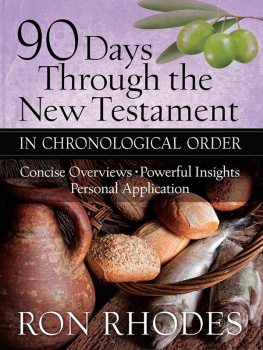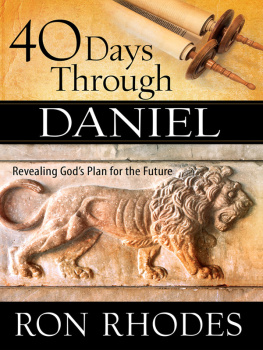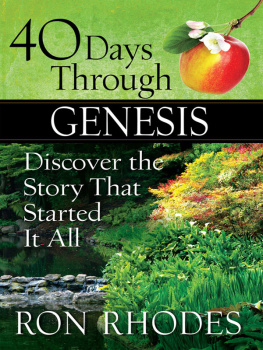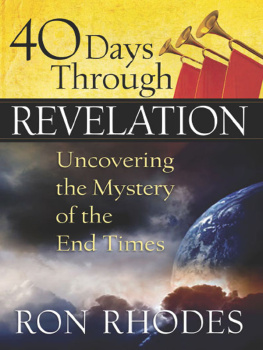

HARVEST HOUSE PUBLISHERS
EUGENE, OREGON
Unless otherwise indicated, Scripture quotations are from the ESV Bible (The Holy Bible, English Standard Version), copyright 2001 by Crossway, a publishing ministry of Good News Publishers. Used by permission. All rights reserved.
Verses marked NKJV are taken from the New King James Version. Copyright 1982 by Thomas Nelson, Inc. Used by permission. All rights reserved.
Verses marked NIV are taken from the Holy Bible, New International Version, NIV. Copyright 1973, 1978, 1984, 2011, by Biblica, Inc. Used by permission of Zondervan. All rights reserved worldwide. www.zondervan.com
Cover by Dugan Design Group, Bloomington, Minnesota
Cover photos iStockphoto / Model-la, IgOrZh
40 DAYS THROUGH REVELATION
Copyright 2013 by Ron Rhodes
Published by Harvest House Publishers
Eugene, Oregon 97402
www.harvesthousepublishers.com
Library of Congress Cataloging-in-Publication Data
Rhodes, Ron.
40 days through Revelation / Ron Rhodes.
p. cm.
Includes bibliographical references (p.).
ISBN 978-0-7369-4827-2 (pbk.)
ISBN 978-0-7369-4828-9 (eBook)
1. Bible. N.T. RevelationDevotional use. I. Title.
BS2825.54.R49 2013
228'.06dc23
2012026063
All rights reserved. No part of this publication may be reproduced, stored in a retrieval system, or transmitted in any form or by any meanselectronic, mechanical, digital, photocopy, recording, or any otherexcept for brief quotations in printed reviews, without the prior permission of the publisher.
To Kerri with love and appreciation
After I became a Christian, I read one prophecy book after another. I could not get enough, gravitating toward those written by professors at Dallas Theological SeminaryJohn F. Walvoord, J. Dwight Pentecost, Charles Ryrie, and others. I found their books to be intelligently and persuasively written.
Little did I know then that in the not-too-distant future, I would actually enroll at Dallas Theological Seminary and take courses under these men, obtaining masters and doctoral degrees in theology. As I now write about the prophetic book of Revelation, I want to acknowledge my personal indebtedness to these teachers of the Word. Their work continues to bear fruit in my life.
I also want to offer continued praise to God for the wonderful family He has blessed me withmy wife, Kerri, and my two grown children, David and Kylie. With every year that passes (much too quickly!) I grow in appreciation for these three.
Thank You, Lord! I am grateful.
Contents
Thank you for joining me in this exciting journey through the book of Revelation. You are in for a spiritually uplifting time! My hope and prayer is that as you read 40 Days Through Revelation , you will attain
a thorough understanding of Gods sovereignty and control over human history,
an assurance that God will one day providentially cause good to triumph over evil,
a yearning for the soon coming of Jesus Christ at the rapture,
a joyful anticipation of our future in heaven, where we will not only be reunited with Christian loved ones but also dwell face to face with God Himself,
an exalted view of the true majesty and glory of Jesus Christ,
a deep appreciation for the wondrous salvation we have in Jesus Christ,
and an increased conviction of the trustworthiness of the Bible in general and the prophecies in the Bible in particular.
The book of Revelation is the only book in the Bible that promises a special blessing to those who read it and obey its message: Blessed is the one who reads aloud the words of this prophecy, and blessed are those who hear, and who keep what is written in it, for the time is near (Revelation 1:3). Blessed is the one who keeps the words of the prophecy of this book (Revelation 22:7). So be encouraged. Blessing awaits you as you study this fascinating prophetic book.
As we begin our journey together, I want to address a few things that will lay a foundation for better understanding the book of Revelation. Lets look at the big picture first, and then we will zoom in on the details in subsequent chapters.
The Author and Recipients of Revelation
The author of the book of Revelation is the apostle John (see Revelation 1:1,4,9; 22:8). This is confirmed by second-century witnesses, such as Justin Martyr, Irenaeus, Clement of Alexandria, and Tertullian.
John had been imprisoned on the isle of Patmos, in the Aegean Sea, for the crime of sharing the message about Jesus Christ (Revelation 1:9). This island is where John received the revelation. The book was apparently written around AD 95.
The original recipients of the book were Christians who lived some 65 years after Jesus had been crucified and resurrected from the dead. Many of these were second-generation Christians, and the challenges they faced were great. Their lives had become increasingly difficult because of Roman hostilities toward Christianity.
The recipients of the book were suffering persecution, and some of them were even being killed (Revelation 2:13). Unfortunately, things were about to get even worse. John therefore wrote this book to give his readers a strong hope that would help them patiently endure amid relentless suffering.
At the time, evil seemed to be prevailing at every level. However, Revelation indicates that evil will one day come to an end. Sin, Satan, and suffering will be forever banished. Believers will no longer know sorrow or death, and fellowship with God will be perpetual and uninterrupted. This was good news for the suffering church in Johns day.
A Contextual Outline of Revelation
John provides a contextual outline of his prophetic book in Revelation 1:19: Write therefore the things that you have seen, those that are and those that are to take place after this.
The things that you have seen is a reference to Revelation 1, where we find a description of Jesus in His present majestic glory and an introduction to the book of Revelation.
Those that are relates to the then-present circumstances of the seven churches of Asia Minor recorded in Revelation 23. John directed his book to these seven churches.
Those that are to take place after this refers to the futuristic prophecies of the tribulation period, the second coming, the millennial kingdom, the great white throne judgment, and the eternal state, which are described in Revelation 422.
The book closes by informing Gods people that they will enjoy His presence forever in a new heaven and a new earth (Revelation 21:1). Jesus promises, I am coming soon (22:20). Such wonderful promises regarding the future empower suffering believers to patiently endure the present.
Approaches to the Book of Revelation
Scholars throughout the ages have taken four primary interpretive approaches in studying the book of Revelation.
1. The historicist view . This approach to Revelation holds that the book supplies a prophetic panorama of church history from the first century to the second coming of Christ. This approach emerged in the fourth century when some interpreters saw parallels between current events and biblical prophecy. Later, Joachim of Fiore (AD 11351202) developed the approach by dividing history into three ages. The Reformers were attracted to historicism and viewed the pope as the antichrist.
But a comparison of Revelation with other prophetic Scriptures (for example, Daniel 9:25-27; Matthew 2425, 2 Thessalonians 2:1-12; Titus 2:13-14) reveals that these prophecies point to the future tribulation period, antichrist, second coming, millennial kingdom, great white throne judgment, and eternal state.
Next page
